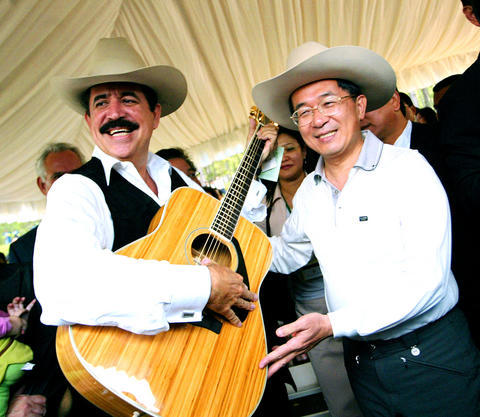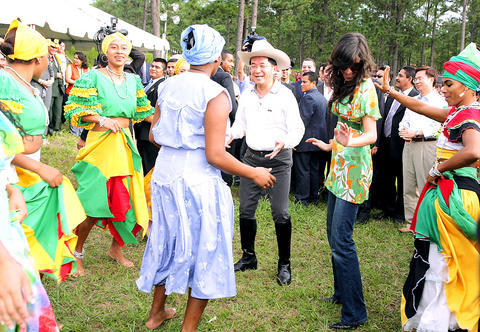Taiwan signed a joint communique with seven of its diplomatic allies in Central America and the Caribbean on Thursday, but a proposal that the document also include a clause stating that Taiwan is an independent nation that deserves to join international organizations such as the UN and WHO was left out of the document.
Leaders from Guatemala, El Salvador, Belize, Nicaragua, Panama, Honduras and the Dominican Republic put pen to paper during the ceremony, where it was also revealed that Taiwan has offered NT$330 million (US$10 million) over the next 10 years to help its allies nurture and develop technical talent.
President Chen Shui-bian (陳水扁) did not seem to be overly concerned about the omission of the clause when approached by Taiwanese reporters for comment after the summit.

PHOTO: AFP
"It's OK that they express their support for us in other ways and means as long as we reach the goal," he said.
Chen said it was common knowledge that not all of the nation's diplomatic allies supported Taiwan's attempts to join international organizations.
different reasons

PHOTO: CNA
While different countries have different reasons for their stances, Chen said that he could understand their difficulties and believed it would not affect the relations between Taiwan and its allies.
Chen, who was scheduled to leave for El Salvador yesterday, is in Central America on a three-nation visit.
He said that he had planned to announce the 10-year, US$10 million project at the summit, but Nicaragua brought it up first, so he responded.
"We are not writing a check here, but doing something that is meaningful for our friends," he said.
UN standard
Chen said that Taiwan's foreign aid as a percentage of the nation's GDP was considerably lower than the UN standard recommendation of 0.7 percent.
Taiwan used to accept aid from other countries, but now it is time to help others, he said.
Minister of Foreign Affairs James Huang (黃志芳) said that the government would commence channeling the money next year, and added that the public should not interpret the aid as "checkbook diplomacy."
Among the proposals that Taiwan "gladly accepted" in the communique was a study of the possibility of establishing a fund to assist the nation's diplomatic allies in Central America and the Caribbean with the improvement of their infrastructure.
Another was to encourage state-run businesses in Taiwan to invest in the region and also to use the "Jung Pang Project" in a more flexible manner.
The "Jung Pang Project" refers to the investment project worth NT$7.5 billion that Chen announced during his last visit to Central America in October 2005.
Development
The funding was allocated to promote the development of the nation's allies in Central and South America by coordinating non-governmental resources to invest there.
Regarding a US$300 million hydroelectric power station that Taiwan plans to help Honduras construct, Chen said that it was not a new development, and that Legislative Speaker Wang Jin-pyng (
This was when Wang acted as Chen's representative at the inauguration ceremony for Honduran President Manuel Zelaya.
The US$5 million low interest loan to Honduras was not new either, Chen said, as the International Cooperation and Development Fund approved the budget in March.
Meanwhile in Taiwan, the Chen's promise to help build the hydroelectric plant in Honduras provoked more debate between the Democratic Progressive Party (DPP) and Chinese Nationalist Party (KMT) caucuses yesterday.
At a press conference held at the legislature, KMT caucus whip Hsu Shao-ping (
Citing a survey conducted by the Chinese-language Apple Daily among 607 people on Thursday, Hsu said about 78.93 percent of the respondents said they were opposed to the government's plan to subsidize Taiwan's allies.
"The results showed that people are very resentful of checkbook diplomacy," Hsu said.
KMT Legislator Lee Ching-an (李慶安), who was also at the conference, lashed out at the president, saying that he was trying to "cover up the disorder of domestic affairs and the economy by focusing on diplomacy."
Meanwhile, the DPP caucus threw its support behind the president, saying that the foreign aid was a reciprocal investment in Honduras.
"Checkbook diplomacy only existed when the KMT was in power," DPP Legislator Yeh Yi-chin (
"After the DPP came to power, it realized that it is impossible to make real friends by giving out money and that we can never compete with China in the checkbook diplomacy stakes," she said.
"The public should not think of our diplomatic efforts as checkbook diplomacy," Yeh said.

Conflict with Taiwan could leave China with “massive economic disruption, catastrophic military losses, significant social unrest, and devastating sanctions,” a US think tank said in a report released on Monday. The German Marshall Fund released a report titled If China Attacks Taiwan: The Consequences for China of “Minor Conflict” and “Major War” Scenarios. The report details the “massive” economic, military, social and international costs to China in the event of a minor conflict or major war with Taiwan, estimating that the Chinese People’s Liberation Army (PLA) could sustain losses of more than half of its active-duty ground forces, including 100,000 troops. Understanding Chinese

The Ministry of Foreign Affairs (MOFA) yesterday said it is closely monitoring developments in Venezuela, and would continue to cooperate with democratic allies and work together for regional and global security, stability, and prosperity. The remarks came after the US on Saturday launched a series of airstrikes in Venezuela and kidnapped Venezuelan President Nicolas Maduro, who was later flown to New York along with his wife. The pair face US charges related to drug trafficking and alleged cooperation with gangs designated as terrorist organizations. Maduro has denied the allegations. The ministry said that it is closely monitoring the political and economic situation

UNRELENTING: China attempted cyberattacks on Taiwan’s critical infrastructure 2.63 million times per day last year, up from 1.23 million in 2023, the NSB said China’s cyberarmy has long engaged in cyberattacks against Taiwan’s critical infrastructure, employing diverse and evolving tactics, the National Security Bureau (NSB) said yesterday, adding that cyberattacks on critical energy infrastructure last year increased 10-fold compared with the previous year. The NSB yesterday released a report titled Analysis on China’s Cyber Threats to Taiwan’s Critical Infrastructure in 2025, outlining the number of cyberattacks, major tactics and hacker groups. Taiwan’s national intelligence community identified a large number of cybersecurity incidents last year, the bureau said in a statement. China’s cyberarmy last year launched an average of 2.63 million intrusion attempts per day targeting Taiwan’s critical

‘SLICING METHOD’: In the event of a blockade, the China Coast Guard would intercept Taiwanese ships while its navy would seek to deter foreign intervention China’s military drills around Taiwan this week signaled potential strategies to cut the nation off from energy supplies and foreign military assistance, a US think tank report said. The Chinese People’s Liberation Army (PLA) conducted what it called “Justice Mission 2025” exercises from Monday to Tuesday in five maritime zones and airspace around Taiwan, calling them a warning to “Taiwanese independence” forces. In a report released on Wednesday, the Institute for the Study of War said the exercises effectively simulated blocking shipping routes to major port cities, including Kaohsiung, Keelung and Hualien. Taiwan would be highly vulnerable under such a blockade, because it